The 12 Worst Eating Habits For Your Metabolism

When it comes to maintaining a healthy lifestyle, the health of your metabolism is incredibly important. Often referred to as the body's internal furnace, your metabolism is responsible for converting foods and drinks into energy. This chemical process regulates the rate at which your body burns calories and, in turn, influences weight management and well-being.
While your metabolism can function like a finely tuned machine, constantly churning out the energy necessary to power essential bodily functions—even while you're sleeping and at rest—if this engine slows down, it can cause issues with weight, energy levels, and overall health.
Sometimes you can have a slow metabolism without even realizing it. Common symptoms of a slower metabolism include things like hair loss, dry skin, fatigue, weight gain, or trouble losing weight. Although it can be frustrating to live with a slower metabolism, there are certain eating habits you can change to help speed up your metabolic rate and reach some of your health goals.
Read on to learn about some of the worst eating habits for metabolism, and if you're looking for some healthy foods that can help improve your health, check out these 10 Best High-Protein Foods to Boost Metabolism.
Eating too many refined carbohydrates and added sugars.
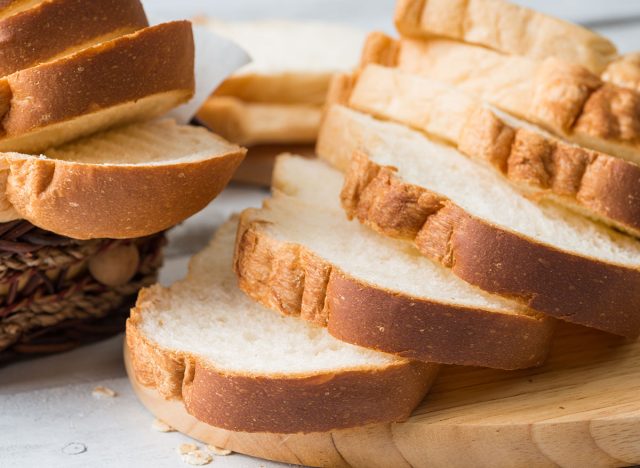
According to Mary Sabat MS, RDN, LD, eating a diet that is too high in refined carbohydrates may be harming your metabolism.
"Consuming excessive refined carbohydrates, such as sugary cereals and white bread, can cause rapid spikes in your blood sugar levels, followed by blood sugar crashes," says Sabat. "These fluctuations can disrupt your metabolism, making it harder for your body to regulate energy and fat storage effectively."
Similar effects can come from too many added sugars specifically, with Sabat adding, "High sugar consumption can lead to insulin resistance, a condition where your cells become less responsive to insulin, which hinders your body's ability to control blood sugar levels and efficiently store fat, negatively impacting your metabolism. As with eating too many refined carbohydrates, the blood sugar often drops too low after the high sugar intake, leading to hunger and overeating."
RELATED: 5 Mistakes Women Make That Slow Their Metabolism
Not getting enough healthy fats.
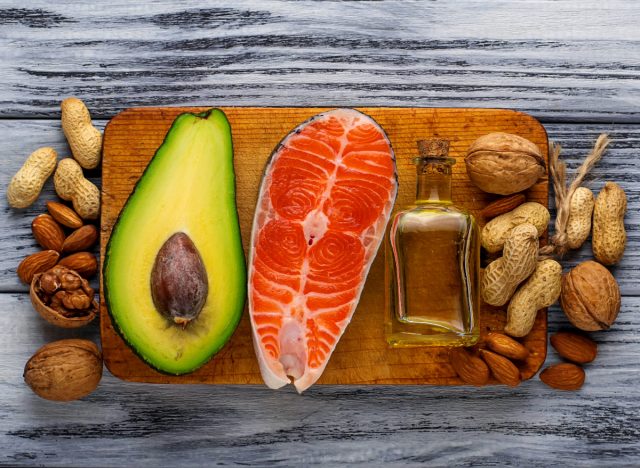
Aside from the fact that sources of healthy fats like fish, avocados, and nuts are delicious and filling, these healthy fats are also important for your metabolic health, too. Without them, your metabolism may be negatively impacted.
"Not having healthy fats in your diet can disrupt metabolism because fats play a crucial role in hormone regulation and overall metabolic function," says Sabat. "Healthy fats, such as those found in avocados, nuts, and olive oil, are essential for the absorption of fat-soluble vitamins (A, D, E, and K) and the production of important hormones like insulin and thyroid hormones. Without adequate healthy fats in a meal, your body may struggle to maintain hormonal balance and proper nutrient absorption, potentially leading to metabolic irregularities and energy imbalances."
To make sure you're getting healthy fats into your diet, try putting a few avocado slices on top of your rice bowl, use olive oil and vinegar as a salad dressing, or grab a handful of your favorite type of nuts to eat as a snack.
Crash dietiting.

We know how easy it can be to fall prey to the allure of crash diets, especially as the pressure to lose weight quickly is all around us. However, crash dieting is never healthy, and it can actually mess with your metabolism.
"Extreme calorie restriction and crash diets can slow down your metabolism as your body adapts to the reduced calorie intake by conserving energy," says Sabat. "This adaptation often results in muscle loss, making it harder to maintain a healthy weight once normal eating resumes."
Sabat emphasizes a slow integration of better eating habits, saying "Adapting a lifestyle change over time, rather than a quick and radical change in eating habits, will result in long-term health and weight control."
Eating a diet low in vitamins and minerals.

Eating mostly processed foods and not getting enough fruits and vegetables can result in you not getting adequate levels of important vitamins and minerals, something Sabat says may harm your metabolic health.
"Eating a diet low in vitamins and minerals can disrupt metabolism because these micronutrients play vital roles in various metabolic processes. For instance, vitamins and minerals are essential cofactors for enzymes involved in energy production, nutrient metabolism, and hormone regulation," says Sabat. "When your body lacks these essential nutrients, it can struggle to efficiently convert food into energy, regulate appetite, and maintain proper metabolic balance, potentially leading to a slower metabolism and various metabolic disorders."
The solution? Sabat says "Giving your body a well-balanced, colorful diet will ensure that the requirements for vitamins and minerals can be met and avoid metabolism disruptions."
Skipping your post-workout snack.

"To lose weight, some people will think, 'I don't need to eat a post-workout snack,' but what happens next is no good," says Amy Goodson, MS, RD, CSSD, LD. "Typically, they will feel extra hungry in the hours to follow and often overeat (especially carbohydrates). So, not only did they miss their optimal recovery nutrition window, but now they have put themselves on a blood sugar roller coaster, which can have negative effects on metabolism."
If you remember from earlier in our article, it's best to avoid blood sugar spikes and crashes when you can, because experiencing this consistently can wreak havoc on your metabolism. To avoid this, eat a post-workout snack like a protein bar or shake, cottage cheese with berries, or a slice of whole-grain toast with avocado and a hard-boiled egg.
Drinking too much alcohol.

When you consume alcohol, your body prioritizes the breakdown of alcohol over the other nutrients you've consumed. "This may lead to increased fat storage and reduced fat burning," says Lisa Young, PhD, RDN.
Sabat agrees, saying it's important not to consume too much alcohol when you want to improve your metabolic health.
"Excessive alcohol intake can slow metabolism because your body prioritizes metabolizing alcohol over burning fat and calories," says Sabat, "and additionally, alcohol can lead to increased appetite and poor food choices."
Not eating enough protein throughout the day.
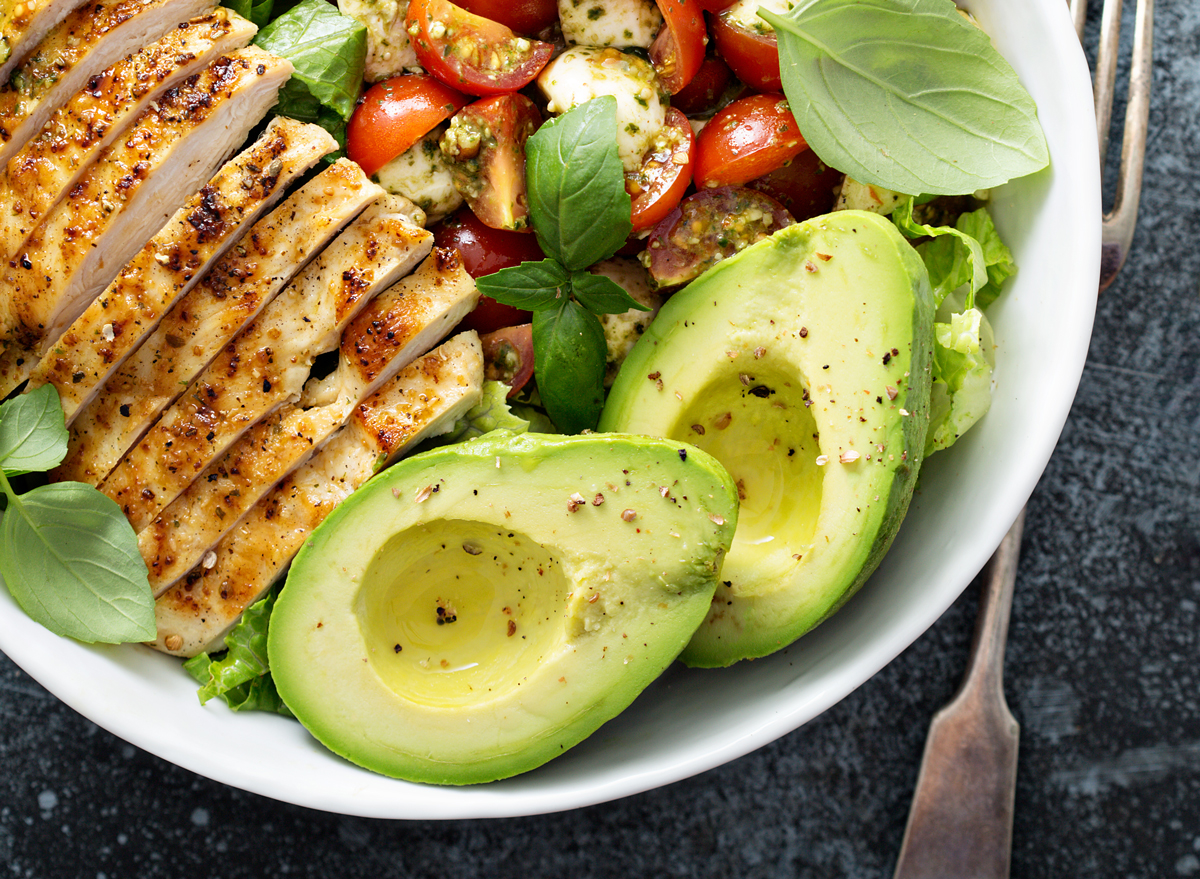
Getting enough protein is an important part of boosting your metabolic health. According to a study published in the journal Nutrition & Metabolism, consuming a high-protein diet is directly correlated to better overall metabolism.
Lauren Harris-Pincus, MS, RDN, founder of Nutrition Starring You adds that it's not only how much protein you eat, but when you eat it that matters. "Most of us consume enough total protein but we don't properly divide it between our meals and snacks to maximize our muscle growth and repair," says Pincus.
She recommends setting a specific goal of protein for every meal to make sure you get enough throughout the day. "You'll want to go for a minimum of about 20 to 25 grams of protein (3 to 4 ounces) per meal, especially during breakfast," says Pincus.
Skipping breakfast.
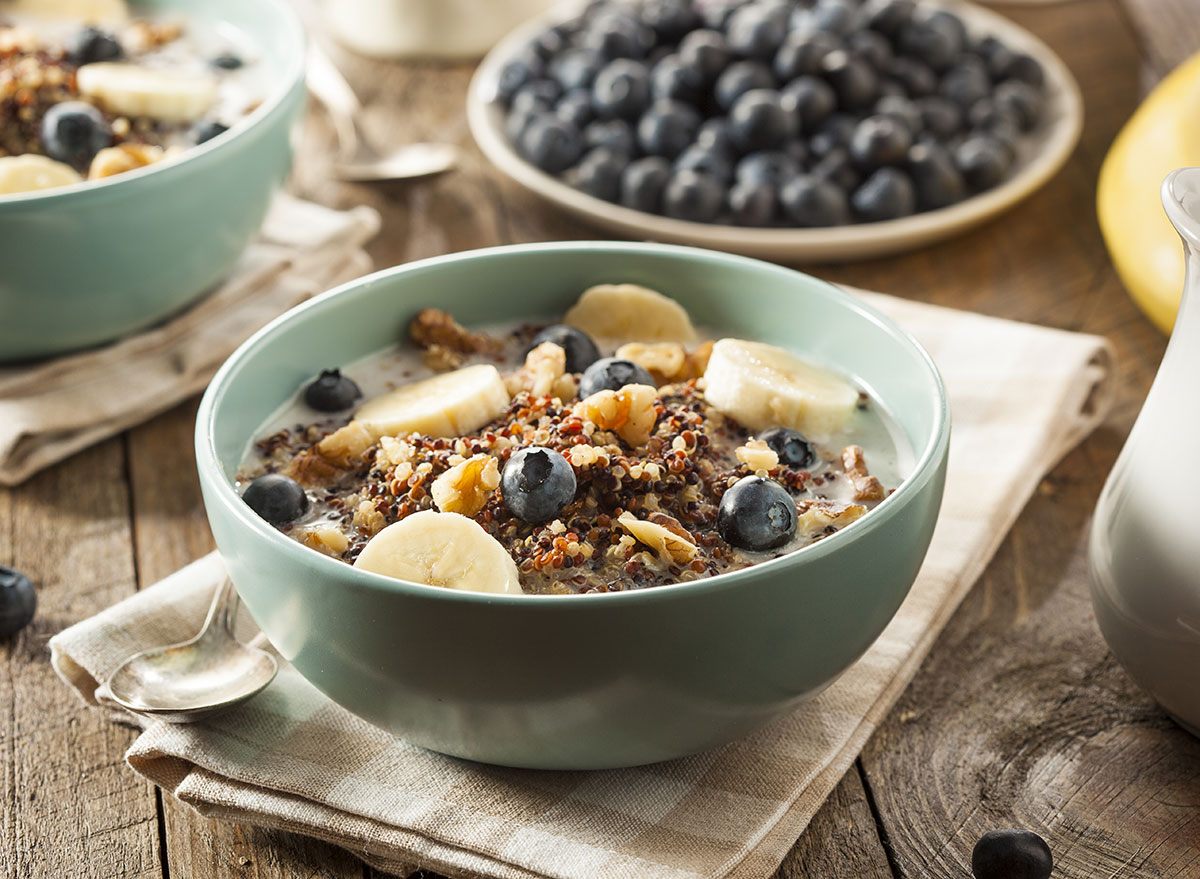
It can be tempting to wake up in the morning and skip breakfast. Maybe you are super busy and forget to have food with your coffee, or perhaps you are trying to cut calories so you decide to avoid the first meal of the day. Whatever the reason for skipping, you may want to reconsider!
"Think of your metabolism like a fire; for it to burn, you have to light it," says Goodson, "and breakfast does just that."
If you're someone who struggles to "start this fire" in the morning, try changing up your breakfast routine so you can fit in a balanced meal.
"The goal is to start your fire, or metabolism, with a nutrient-rich breakfast of fiber, protein, and healthy fat," says Goodson. "That could include things like eggs with veggies, oatmeal with peanut butter, Greek yogurt with berries, or a breakfast wrap on a whole-grain tortilla with egg, cheese, lean protein (veggies are a plus), and a side of fruit."
Getting too many of your daily calories at night.

Yes, focusing on breakfast can help with metabolism, but it's also important to take a look at your other meals throughout the day. For instance, people who eat a ton of calories for dinner or later at night may be negatively impacting their metabolism.
"Our bodies like to eat during daylight hours when we are more active and need proper fueling," says Pincus. We don't eat food while we sleep, because our bodies don't need to, but what we eat during the day affects our evening hours, which in turn affects our metabolism!
"As the sun sets, your digestive system slows down to prepare for sleep, so people who skip breakfast, eat little during the day, and consume a large portion of their daily calories in the evening are working against natural biorhythms," says Pincus.
To balance your metabolism based on your natural circadian rhythm, Pincus suggests eating a nourishing breakfast, a larger and hearty lunch, and a smaller dinner portion.
Not eating enough fiber.
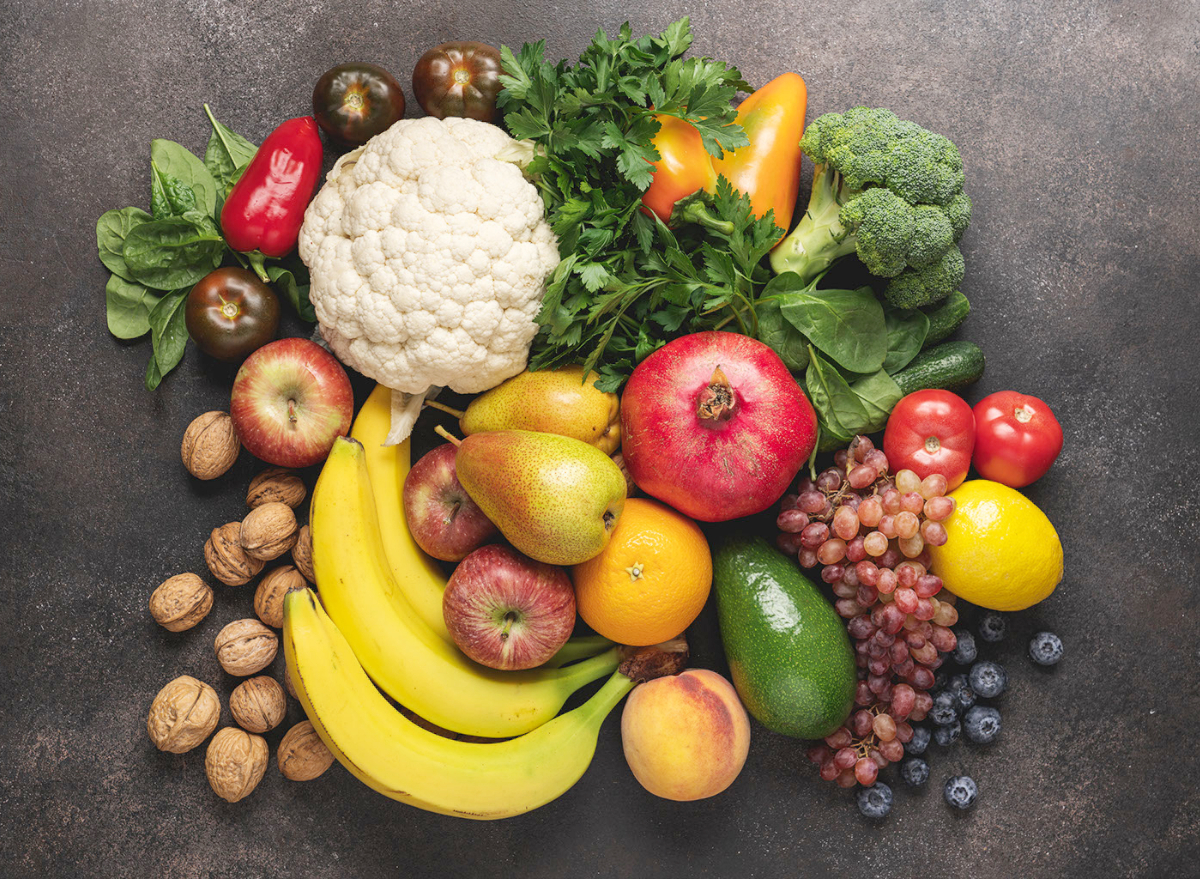
Fiber is a crucial component in caring for your metabolic health. According to Nutrients, fiber not only helps you maintain a healthy metabolism, but it also helps fight things like type 2 diabetes, cardiovascular disease, and even cancer.
When it comes to your metabolism, fiber can help in two main ways: the digestion process, and by keeping you full.
"Fiber can increase metabolism by requiring more energy to process," says Pincus, "and fruits, vegetables, nuts, beans, seeds, and whole grains that contain fiber help to keep you full and well-nourished throughout the day."
Not getting enough calories.

Cutting calories can sometimes be an effective way to reach your weight loss goals, but if you don't consume enough calories throughout the day that your body needs, it can slow down your metabolism.
"You have to eat calories to burn calories," says Goodson, "and while a caloric deficit is needed for weight loss, consuming too few calories can make your body think food is scarce and slow down its metabolism to compensate."
Eating too much ultra-processed food.

Your metabolism is affected by the amount of food you eat and when you eat it, but it's also impacted by the type of food you eat. Many experts recommend limiting your processed food intake for this reason.
"Highly processed packaged foods are typically digested quickly and lack fiber, which means they don't require a lot of energy for processing," says Pincus.
But sometimes you are in a bind, and you need to grab a quick snack. If you need to go for the packaged food, Pincus suggests looking for "something with fiber-rich ingredients like whole grains, nuts, seeds, beans, fruits, and veggies when possible."
This article has been updated since it was originally published to include additional entries, research, and proofreading revisions.
- Source: Clemente-Suárez VJ, Mielgo-Ayuso J, Martín-Rodríguez A, Ramos-Campo DJ, Redondo-Flórez L, Tornero-Aguilera JF. The Burden of Carbohydrates in Health and Disease. Nutrients. 2022 Sep 15;14(18):3809. doi: 10.3390/nu14183809. PMID: 36145184; PMCID: PMC9505863.
- Source: Tardy AL, Pouteau E, Marquez D, Yilmaz C, Scholey A. Vitamins and Minerals for Energy, Fatigue and Cognition: A Narrative Review of the Biochemical and Clinical Evidence. Nutrients. 2020 Jan 16;12(1):228. doi: 10.3390/nu12010228. PMID: 31963141; PMCID: PMC7019700.
- Source: Pesta DH, Samuel VT. A high-protein diet for reducing body fat: mechanisms and possible caveats. Nutr Metab (Lond). 2014 Nov 19;11(1):53. doi: 10.1186/1743-7075-11-53. PMID: 25489333; PMCID: PMC4258944.
- Source: Lattimer JM, Haub MD. Effects of dietary fiber and its components on metabolic health. Nutrients. 2010 Dec;2(12):1266-89. doi: 10.3390/nu2121266. Epub 2010 Dec 15. PMID: 22254008; PMCID: PMC3257631.
- Source: Kouda K, Nakamura H, Kohno H, Okuda T, Higashine Y, Hisamori K, Ishihara H, Tokunaga R, Sonoda Y. Metabolic response to short-term 4-day energy restriction in a controlled study. Environ Health Prev Med. 2006 Mar;11(2):89-92. doi: 10.1007/BF02898148. PMID: 21432368; PMCID: PMC2723638.









